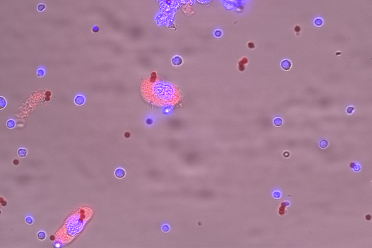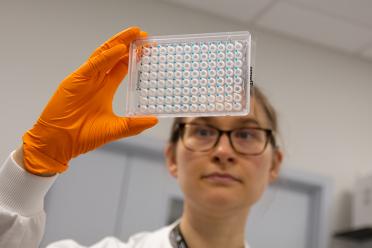Hidden jewels in our blood could hold secrets of healthy ageing
They are so small they can barely be seen under a microscope, but platelets play an essential role in repair and defence of our bodies.
These tiny cells - your body’s inbuilt bandage to stop bleeding – could hold some of the answers to essential questions facing our ageing population.
Following an injury, platelets will group together at the site of the wound, plugging it with a clot to prevent loss of blood.
As a molecular haematologist with a particular interest in platelet biology, Earlham Institute Group Leader Dr Edyta Wojtowicz is studying the origins of platelets and how they are affected by our diets.
Platelets are produced by a small pool of cells called megakaryocytes, which reside in our bone marrow.
Megakaryocytes are born from stem cells. They are large, fragile, easy to find - but difficult to successfully isolate. Dr Wojtowicz says she has been fascinated by them since her first encounter.
“These cells are very impressive in size and difficult to isolate, so very much a challenge,” she says.
“They are beautiful – they look stunning when they are stained, almost like jewellery.”

Stained cells under a microscope showing the megakaryocytes
The megakaryocytes in your body produce more than 1 million platelets a second, in a process called thrombopoiesis. But this number is an average estimate.
Dr Wojtowicz says: “Some megakaryocytes naturally produce fewer platelets, and some far more. We can use a modification of supermarket barcoding for products - inserting small fragments of DNA to trace and count which stem cells produce which megakaryocytes and platelets.”
Platelet production and function slows as we age - meaning older people frequently suffer from a shortage of platelets. This leads to more difficulty healing and means it takes longer to recover from injuries. With age also platelets become too active, which can cause cardiovascular diseases.
“If we can identify a stem cell and megakaryocytes which produce a lot of platelets,” she explains, “then we can improve our understanding of how to increase platelet production.”


Some megakaryocytes naturally produce fewer platelets, and some far more. We can use a modification of supermarket barcoding for products - inserting small fragments of DNA to trace and count which stem cells produce which megakaryocytes and platelets.

People worldwide are living longer. Today, most people can expect to live into their sixties and beyond.
In England, the percentage of people 65 and over is predicted to rapidly rise by 2030 - putting increasing pressure on our NHS - and the proportion of the world's population over 60 years is expected to nearly double over the next decades from 12 per cent in 2015 to 22 per cent in 2050.
Dr Wojtowicz refers to healthspan, rather than lifespan. “Healthy ageing is not just about getting older - it’s about quality of life. How do we maintain good health as we age?”
A number of so-called 'super-ager' communities have been identified globally over the years. The proportion of centenarians in these regions can be more than 10 times the global average, and their overall health is also better.
Okinawa in Japan, Sardinia in Italy, Ikaria in Greece and Loma Linda in California are among these communities - all of great interest to scientists. The diet and exercise regime of these populations is of particular interest.
Dr Wojtowicz says her work will include the impact of dietary intervention on hematopoiesis - the formation of blood cellular elements - and immune system function in health and disease.
“In particular,” she says, “I want to investigate how molecular, metabolic and microbiome changes shape both of these systems.”

Dr Edyta Wojtowicz, Group Leader at the Earlham Institute

These cells are very impressive in size and difficult to isolate, so very much a challenge, they are beautiful – they look stunning when they are stained, almost like jewellery.

Future projects from the Wojtowicz Group will include: exploring the effects of a plant-based diet on immune and hematopoietic system function during infection or cancer; characterising response of megakaryocytes and platelets to infections, cancer progression or stress; and understanding how megakaryocytes regulate platelet production.
Dr Wojtowicz took an MSc in Medical Biotechnology at the Jagiellonian University, Krakow, followed by a PhD in molecular medicine at Rijksuniversiteit Groningen, as a Marie Curie Early Stage Researcher.
Her project involved cellular and molecular characterization of miR-125 family in normal and malignant haematopoiesis. This microRNA family is involved throughout a cell’s lifespan, from stem cell multiplication to differentiation and cell death.
After her PhD, she took up a position as Barncancerfonden Postdoctoral Fellow at the Karolinska Institutet. Here she performed lineage tracing studies using cellular barcoding of haematopoietic stem cells.
Dr Wojtowicz first arrived at the Earlham Institute in May 2019 as a Sir Henry Wellcome Postdoctoral Fellow, working in the Macaulay Group and Rushworth Group at UEA Medical School, before taking up her post as Group Leader.